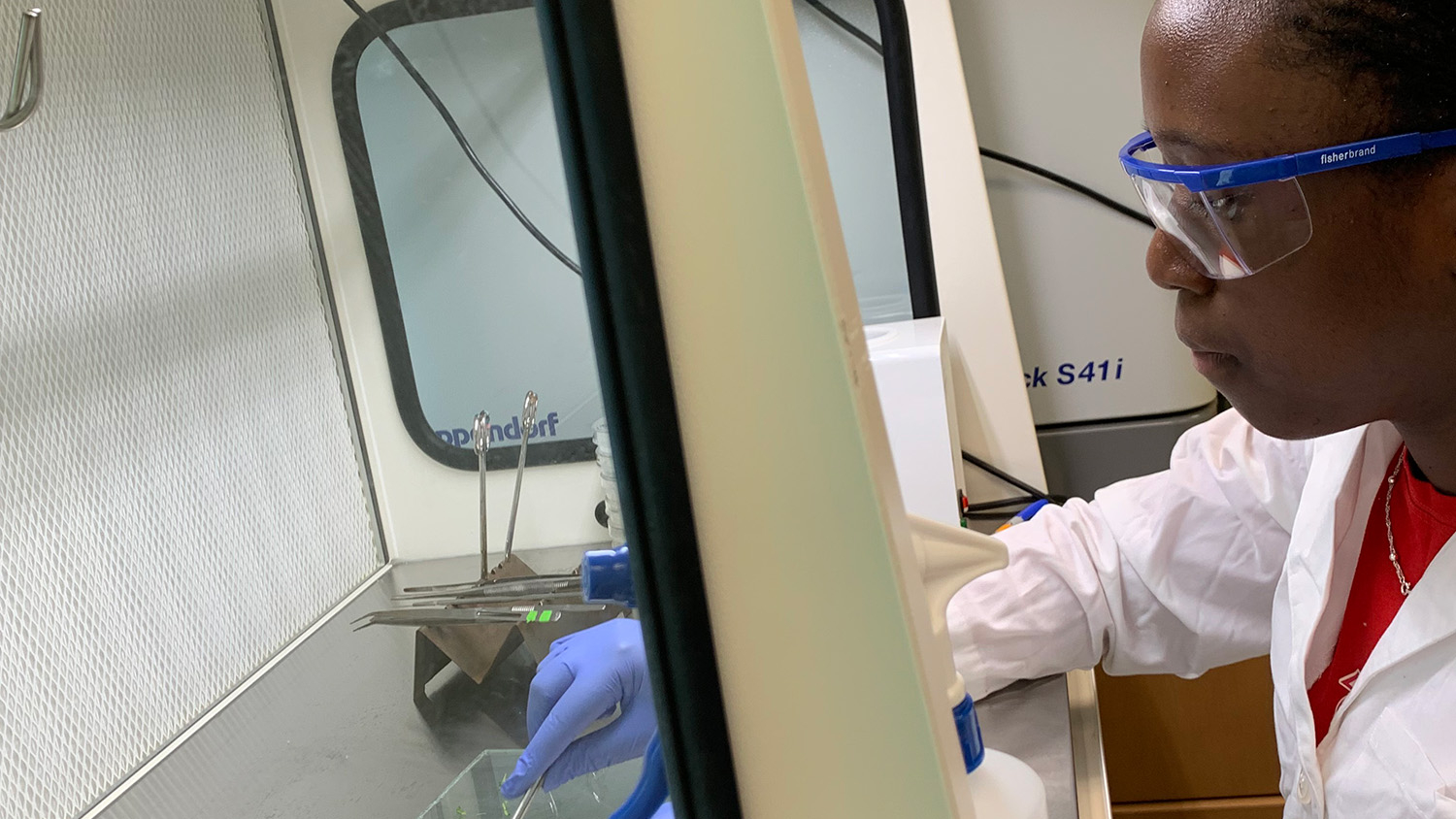Lab to Life: Research, Empathy and Belonging

When Isatou (pronounced eye-sa-too) Kah was 16 years old, a routine checkup revealed she was severely anemic. Her pediatrician gave her one option: get a blood transfusion.
Kah realized she wanted to take control of her health. This revelation launched a mission to explore alternatives and find nutritional methods to improve her iron levels.
“I began online research for dietary options to help supplement my iron,” Kah says. Understanding how food nutrients affect the body sparked her interest in nutrition science.
Kah, from Fayetteville, North Carolina, is in her second year at the College of Agriculture and Life Sciences at NC State University, majoring in nutrition science in the Department of Food Bioprocessing and Nutrition Sciences.
“My classes solidified my interest in a career involving nutrition science. Through my courses, I’m starting to connect how nutrition science relates to health.”
In just two years, Kah has enriched the CALS academic community through scholarly contributions, demonstrated empathetic leadership, and helped to cultivate an inclusive and welcoming campus environment.
Serving to Educate
Kah contributed valuable research to the CALS academic community through NC State’s BIT SURE (Biotechnology Summer Undergraduate Research Experience) program.
BIT SURE gives students the opportunity to work with a biotechnology instructor on a directed undergraduate research project. This program provides students with mentorship while they develop independent research skills. During the summer of 2023, she worked with postdoctoral teaching scholar David Bullock to successfully test the RUBY marker for monitoring gene expression in tobacco and tomato plants, which they documented in their research.

RUBY converts an amino acid found in every cell, called tyrosine, into the bright-red pigment betalain, visible to scientists. Kah learned various lab techniques and helped develop a working protocol for RUBY plant transformation, introducing DNA into plant cells or tissues.

Kah and Bullock maintained a sterile environment where they grew and manipulated young tomato and tobacco seedlings. They transferred specific genes into plant cells, generating transgenic plants. The plant transformation was successful, and they could observe the RUBY marker in plant cultures.
The techniques Kah learned during her summer research project were documented and transferred to the Biotechnology Plant Genetic Engineering (BIT 474/574) course for the 2023 fall semester. BIT 474/574 teaches students how to introduce and track traits in various crops.
“Seeing the RUBY construct in the tomato and tobacco plants, testing the hypothesis and seeing the hypothesis come to life were gratifying moments for me,” Kah says. “The experience solidified my interest in pursuing a research career.”
Serving to Lead
Research isn’t the only thing Kah is passionate about. She also invests her time doing community outreach. Kah loves learning new things, meeting new people, and having different experiences. “Seeing people succeed and overcome different challenges inspires me to keep pushing forward and leave a positive impact.”
Through NC State’s Alternative Service Break program, she extends her interests beyond the classroom and applies her drive for service and teamwork beyond North Carolina.

Kah traveled to Orlando, Florida, during the 2023 spring break with other NC State students to volunteer at Give Kids the World. This nonprofit organization creates memorable experiences for critically ill children and their families.
The NC State students created a “children’s spa” where kids could spray their hair with various colors and even get glitter tattoos. They served ice cream for breakfast and operated accessible rides for the children. They also set up a science-based chemistry station where children chose colored powdered sugars, experimented with them and made edible concoctions.
Kah and the NC State cohort also served at Orlando’s Ronald McDonald House, baking desserts for the children and cooking dinner for their families.
But even more impactful for Kah were the families’ stories of how their children’s illnesses affected them. “It’s a difficult position to be in when your child is critically ill, but they found a way to embrace their situation and enjoy life.”

Moved by the experience, Kah was motivated to lead the 2024 alternative spring break trip. “Last year’s leader did a great job and inspired me to apply.”
Kah got the position and returned to Orlando this March to lead the alternative service group and volunteer with the same two organizations. In addition, the group volunteered at United Against Poverty, a nonprofit organization that makes groceries available to economically disadvantaged families, and New Hope For Kids, a grief center that helps children and families suffering from grief, loss or life-threatening illnesses.
Serving to Belong
When Kah isn’t volunteering and leading her peers, she’s applying her skills at NC State. Serving with the Black Students Board, volunteering at the African American Culture Center, and representing NC State as a university honors ambassador allows Kah to contribute to campus life.
As a Black Students Board member, she helped run festivities and provided logistics for diverse events. “It was a way for me to get to know other Black students around campus,” she says, adding that being a board member encouraged her to socialize and form connections.
She also volunteered as a greeter in the African American Cultural Center’s library, welcoming visitors and helping them locate resources.
As a university honors ambassador, Kah encourages students to develop positive relationships with each other through new learning experiences.
Kah’s attention to time management and organization helps her successfully handle the challenges of being such an active student on and off campus.
“I make more effort to balance social and academic life. It’s been a major lesson for me.”
Kah appreciates all of her successes at NC State, both big and small. “I’m proud of the things I’ve done. My accomplishments don’t have a hierarchy.”